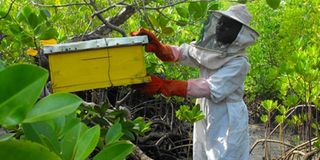Bees offer another reason to conserve mangrove forests

Kibibi Mramba of the Mtongani Self-Help Group, inspects a hive in a mangrove forest in Kilifi. PHOTO | SOPHIE MBUGUA |
What you need to know:
- Mtongani group sells honey at Sh800 a litre and has so far saved Sh83,000.
Dressed in a white coverall tucked in black gumboots and a bee veil that extends to her shoulders, Kibibi Mramba inspects a hive placed inside a mangrove forest.
The hive acts as a collection centre for bees, where they trap them before transferring to their main apiary.
Mramba is a member of Mtongani Self-Help Group in Kidundu, Kilifi County which farms bees in a mangrove forest.
“Mangrove forests flower all the seasons attracting bees throughout the year. It is one of the best places to keep bees. We have six beehives in our apiary.”
There are nine kinds of mangroves in the area that flower in different seasons, explains chair Stephen Nyambu, adding that they have been keeping bees in the forest since 2012.
The group harvests at least 15 litres of honey after three months. They sell a litre at Sh800, mainly through Kwetu Training Centre, an NGO, which supports them.
The group also runs educational programmes on beekeeping for community members, students and tourists.
“We charge Sh100 per student, Sh300 for local tourists and Sh500 for foreigners.”
Apart from honey, the group trades in bee wax and propolis, a sticky black substance made by bees used to seal openings in hives.
The bee wax, which they sell at Sh500 per litre is produced from boiling honey cobs.
“We use the bee wax in hives to make honeycomb foundation. This is important as it attracts bees and directs them where to build the combs. It is also used in production of candles, nail polish, lipstick, soap, shampoo, wax and hair gels,” explains Nyambu.
Though not produced in large quantities, the group further sells propolis at Sh500 a litre to carpenters who use it to seal cracks on furniture.
It is also used in production of chewing gum.
The group operates a bank account where they have saved Sh83,000.
“We pay each member Sh1,000 and then give Sh3,000 to one of us who is to receive the cash in a merry-go-round scheme, which they pay with Sh300 interest after three months,” explains Nyambu.
BETTER HONEY
Mangrove forests, according to Dr James Kairu, a principal scientist at the Kenya Marine and Fisheries Research Institute, is a good place to keep bees because honey produced is far much better than that from any other apiary.
Dr Kairu notes mangrove has a high medicinal value that is transferred into honey through the nectar the bees get from the plants.
“Various species of mangroves are known to treat ailments such as rheumatism, smallpox, constipation, kidney stones, ulcers, toothaches, diarrhoea, sore throat and hepatitis.”
Mangroves grow between the sea and land and are resistant to salinity and flooding hence can withstand aridity better than the terrestrial trees.
They are natural forests and take up excess nutrients from the water.
James Toya, an apiculture expert and trainer at Kwetu Training centre, says mangroves offer favourable habitat for bees since the crops suffer less pest infestation due to their ability to adapt to harsh inter-tidal environment.
“Mangroves are not affected by pests and diseases that attack leaves as it happens with others forest.”
Nyambu says the group, which has already built a 215m board walk in the mangrove forest, plans to engage in eco-tourism.




